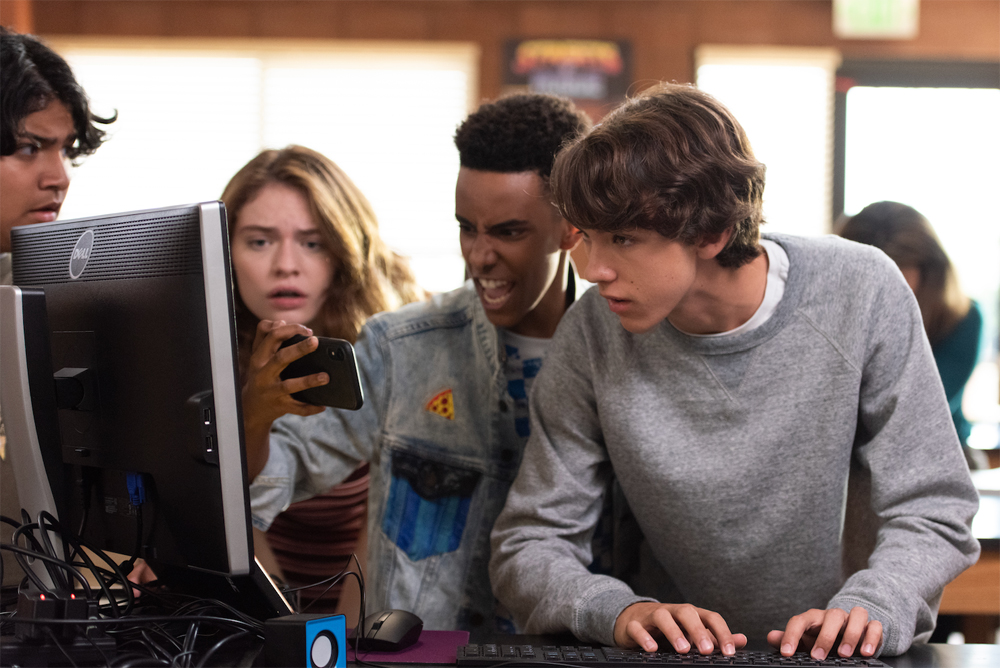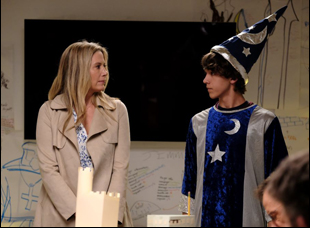Behind the scenes of “Hero Mode,” art imitated life a bit when the Carpenter family was looking for a director for their labor of love, then called “Mayfield’s Game.” After father Jeff had conceived of a story channeling his own experience in the business world and looking at it through the eyes of his son Chris, an editor for the site GameXplain, telling of a game developer called Playfield that had entered creative stagnation until its CEO (Mira Sorvino) empowers her son Troy (Chris Carpenter) to rethink the company’s new game, he had reached a standstill himself after fashioning a script from what he knew personally and what he could glean online, ultimately needing the help of someone with more familiarity with the movie business than he had to shepherd it onto the screen, even with the full backing of his own family who are all given a story credit.
They couldn’t have found anyone better suited than AJ Tesler, a man of many talents who had only directed one other feature — the documentary “Magnolia’s Hope,” about his daughter born with a rare neurological condition known as Rett syndrome — yet could bring to bear years of experience as a production exec at companies like Sarah Silverman’s YouTube network Jash, and while one can see how the pick of an unexpected leader onscreen leads to impressive dividends, the same is true off-screen of the surprisingly poignant “Hero Mode,” in which the teenager thrust into saving the family business infuses new energy into the company but also can be inspired by what the generation that has come before him can impart from their own experience. After working so much in the comedy world, Tesler surrounds Carpenter with an impressive cast of co-stars from Mary Lynn Rajskub, Kimia Behpoornia, Erik Griffin, Bobby Lee and Nelson Franklin, among others, and brings out the real emotions in the connections Troy makes with Jimmy (Sean Astin), his older rival at the company whose game he has been brought in to redevelop, and Paige (Indiana Massara), a new classmate he’s not confident enough to ask out.
Celebrating the way in which everyone has a role to play in the collective success of a company, “Hero Mode” seems like a particularly good fit for Tesler to make his narrative feature debut after playing so many different roles in the filmmaking process before, from being on camera as a resident of Stars Hollow for three years on “Gilmore Girls” to producing comedy specials and with the film now in theaters, he spoke about how he could bring the variety of skills he’s picked up over the years to the director’s chair and how the film’s story resonated with him as he hopes it will with others.
I had a producer friend named E.J. Kavounas, who is primarily a sci-fi producer and this script came to him. It was a comedy, and we had been trying to find a project to work on together, so he asked if I would be interested in getting involved. I thought that the story was really compelling and there was a chance to make a family movie that how Hollywood doesn’t quite make anymore, so I had originally signed on to produce the movie, and in the search for a director, the Carpenters were feeling like there wasn’t anybody that was the perfect fit. They really liked me and my take on the movie, so as we were getting down to the wire of who we were going to hire as a director, they asked me if I would be interested. I thought of a lot over the course of the many weeks that I had signed on to do it, and I was pretty excited about the opportunity.
This seems like more sophisticated than most family films I’ve seen recently. I was really taken aback with the generational element and the beautiful idea of what one can learn from the other. Was that always such a big part of this?
I’ve wanted to make a family film that was a little bit elevated, that would make a good first date movie [as much as it would] also make a good family movie night movie, so there were a lot of important themes that we tried to weave into the movie. Obviously, the teamwork one is big one, but [also] the idea of searching for order in chaos and what a 16-year-old’s perspective of adults are and there’s some jokes that we put in this that are from the adults in the room. Really studying what all those relationships are in real life was certainly one of the goals.
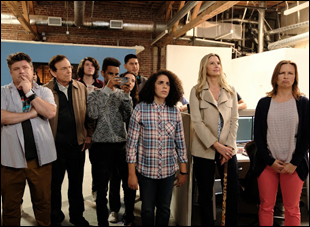
Chris had done another movie or two beforehand, so he had some tape on him that gave us the indication that he was going to be more than capable of doing this, and from there, we leaned on a lot of former relationships and just tried to build the best cast that we possibly could. We hired Dorian Frankel to be the casting director, and she was instrumental in finding us all these incredible people to be in this movie and Chris was a part of the movie from the beginning and ended up being a really incredible creative partner too as we figured out what the games were, He’s a pretty incredible kid and just did all of the work to make sure that he was able to pull off starring in his first feature film.
You also have to create a number of games for the film – did you actually start building them as you were in production on the movie?
Production was relatively quick, so we actually didn’t start fully developing looks until after the edit was complete. Martin Hall, the VFX supervisor, really just willed all that stuff to happen the way that it did. We had a pretty good idea from the script of what these things look like, but translating words into moving pictures obviously took some time and many, many conversations and we didn’t really start until we finished the movie. From there, because we were clear on what we wanted it to look like, it didn’t need to go through that many iterations to get us there, but it probably went through more iterations in the script, as Jeff [Carpenter] and I were trying to figure out what kinds of games fit for each of these categories of games.
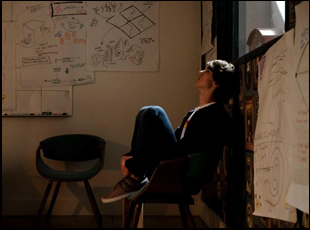
That was one of the first things that I talked to the cinematographer Jonathan Hall about — this idea of how Troy is really trying to find order in the chaos and how when he’s coding, when he’s following his passion, and when he’s creating, he can see more of the world. There’s more to see there, and that’s why he loves it, and that’s why he invests his time and energy into it. And then when he’s not doing those things, his scope of vision is more limited, so practically the original plan was to shoot everything on an anamorphic and then be really conscious of what we wanted to be in traditional 16:9 [aspect ratio]. But because of the budget, we couldn’t do that, so it actually gave us a ton more flexibility the way we ended up doing it [where] we could shrink down any shot to an anamorphic size, which give us a ton of flexibility when we’re in post to really tell the story the way we needed to.
You have some acting experience in your background. Was working with actors something you enjoyed?
That’s one of the great parts about the job is helping the actors and because I had limited experiences as a director and all of these incredible actors I’ve respected for such a long time, [I wanted to] give them the leeway to really determine who this character was and to play with the words. Jeff Carpenter was really gracious in that as the executive producer and writer, understanding that some of these words are going to change as we go, so it was a treat to be able to watch them bring these characters to life and then just to be able to direct them as little as I needed to.
And from what I understand, you contributed three of the songs without ever before playing a note professionally. How did that happen?
Jon Kaplan, our music supervisor and a Grammy award-winning musician, is a friend of mine, and when we were trying to come up with these songs, I was finding samples and things like that, but he said, “You know what? Why don’t you come over? I’ll call my friend Garen [Gueyikian] from Kill the Alarm, and we’ll just hang out, and we’ll write some songs.” That sounded like the coolest thing that anybody had ever asked me to do, and I didn’t have the heart to tell him I didn’t know how to do it. So I showed up and Garen started playing on the guitar, and I started pitching lyrics, and they were like, “Yeah. And then let’s do this.” It was just this wonderful collaboration between these two incredible musicians and also me. [laughs] But it was really, really great and I think that those are three of the strongest songs in the movie.
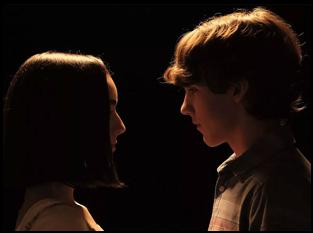
Yeah, it’s an incredible piece of timing. You make these movies, and you hope that people are going to get to see it in theaters and on the independent side, you’re never quite sure. Over the course of the last year-and-a-half, we’ve just assumed that that wasn’t going to happen, so to be able to show it to people in theaters was really special and to be able to sit in a premiere with a full audience, especially after the year that we all had, this being the first time that anybody else has been out in public with other people in a situation like this, it brought me a lot of joy, because we want it to be able to bring joy to people with this movie, so I’m really grateful that it worked out that way.
Given all these creative abilities of yours, was this artistically satisfying? It seems directing is perfect at really pulling all these skills together.
Yeah, I think I’ve had so much experience in producing, and I had experience acting, and this really was a creative combination of all those things and allow me to lean on all of the experience. Was it creatively fulfilling? Absolutely. But I would also say not quite, because now I want to direct more. [laughs] So while this was extremely creatively fulfilling and I got to tell this story in the way that I wanted to tell it, am I fully creatively fulfilled? No. I’ve got a lot more stories to tell.
“Hero Mode” is now in theaters and debuts on digital and on demand on June 11th.




